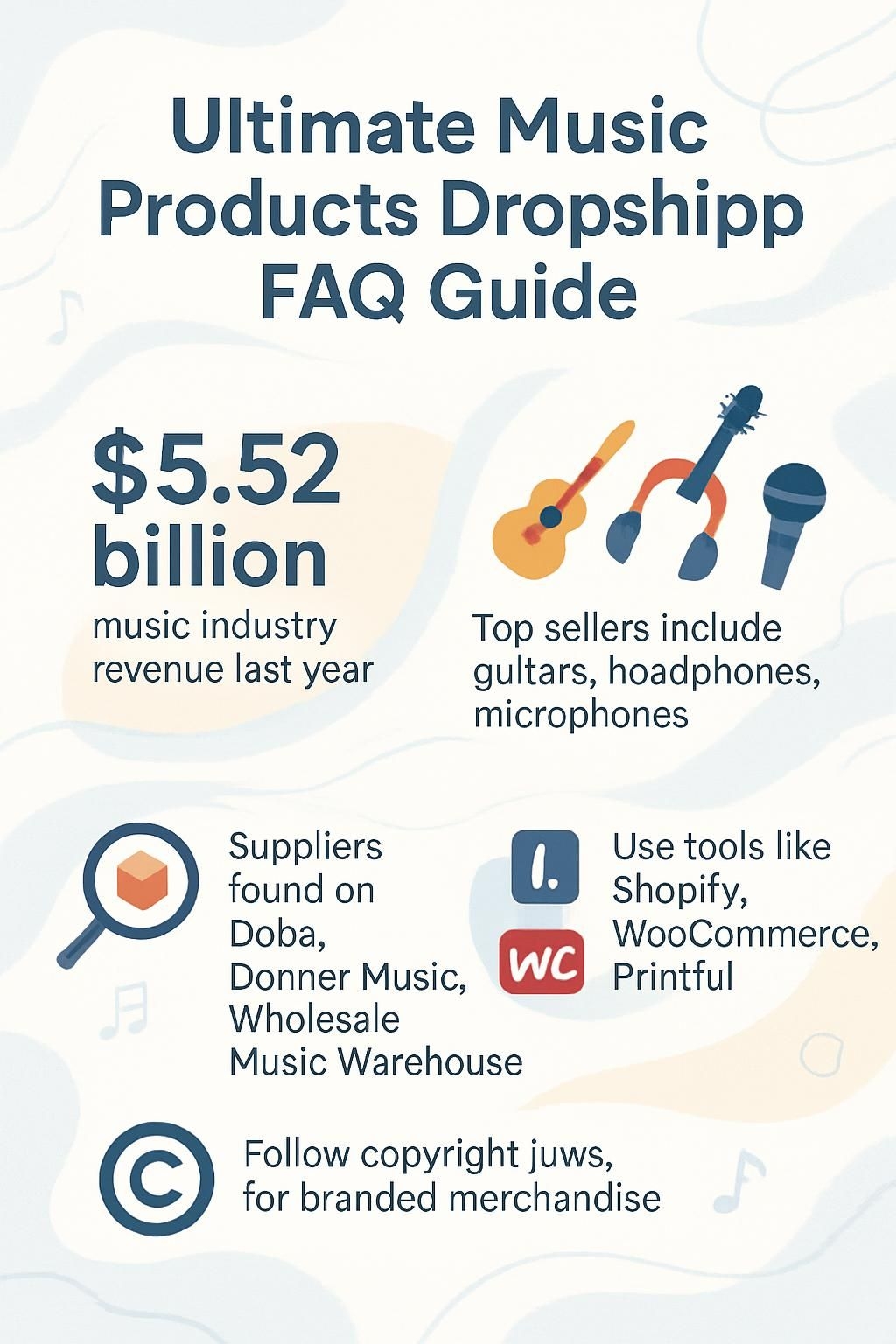You want to start a dropshipping store for music products, but you're stuck with questions and too many choices. The Music Products Dropshipping Faq is here because the music industry made $5.52 billion last year, which means lots of people buy guitars, microphones, or band merch online—no kidding.
This guide gives you clear steps on picking the best items and setting up your online shop fast with tools like Shopify or Ecwid. Don't blink—answers are just ahead!

So, you wanna fill your shop with stuff people actually want, right? Product lines like guitar kits or digital pianos? Oh man, the selection can make your head spin—there's everything from amps to t-shirts flying off shelves.
Anyway, some categories just keep buzzing in online marketplaces and music spaces. I once saw a friend sell a stack of drumsticks faster than he could count them—crazy demand out there for simple accessories!
Alright, let's clarify one thing. You're here because you aim to market music merchandise online with ease. And what's the good news? I've prepared just the list for you. It's focused on what's most popular in the music dropshipping market.
So that's the summary—uncomplicated yet reliable choices that bring in income without causing you stress.
By the way, Printful is a service I consider for those t-shirts and posters; it's a seamless method to manage stock without actually maintaining any inventory, right?
And it would be remiss not to mention digital pianos! They seamlessly integrate into modern homes where space may be limited, but aspirations of playing are not.
But here's the point: not every product will be an instant hit; it's about identifying what connects with your audience—maybe it's retro vinyl players one month and exclusive fanbase merchandise the next?
Honestly, exploring this feels like uncovering a treasure trove at times—but in a positive way! There's always something fresh waiting to be spotted by fervent music fans perusing your store.
Ah! Almost overlooked amplifiers and effects units—they complete any musician's setup, adding the perfect finishing touch that could result in loyal customers keen to enhance their sound.
Discussing enhancements, improving customer experience is vital too—considering offers like free shipping or priority for “VIP dropshipping customers.” It makes them feel exceptional and appreciated.
Real-time order tracking is another beneficial feature—it keeps buyers updated and significantly reduces the amount of “Where's my stuff?” queries.
Wow! That was indeed an extensive list, wasn't it? But stay with me—I guarantee exploring each of these categories will reveal abundant opportunities in the musical instrument dropshipping niche.
Many music lovers want to buy cool gear. As an aspiring entrepreneur, you can tap into this market. Here's a list of top-selling music products that can boost your dropshipping store.
Staying aware of these popular products can help your online store grow big! Selling musical instruments dropshipping can lead to exciting profits if you choose wisely.

Finding good suppliers for your dropshipping music products can feel tricky. You want to pick trustworthy sources, right? Start with platforms like Doba or Wholesale Music Warehouse.
These sites have solid reviews and a range of supplies from guitars to drum kits. Look at what they offer and check their ratings.
Also, consider reaching out directly to brands you love, like Donner Music. Sometimes manufacturers can guide you on how to sell their stuff legally without a ton of fuss. So don't hesitate; keep your options open and do some digging!
You can find reliable suppliers on platforms like Doba, Wholesale Music Warehouse, and Donner Music. These sites connect you with a full range of music products. They let you dropship musical instruments easily.
Doba offers many verified suppliers for your store's needs. Wholesale Music Warehouse has great deals on various musical items. If you're looking for cool gear, check out Donner Music too; they have quality options at good prices.
Using these platforms helps you automate order fulfillment and keeps things running smoothly in your dropshipping business.
Selling music products can be tricky. You need to know about copyright and licensing laws, for starters. It's key to make sure you're not stepping on anyone's toes with their tunes or art. Regarding branded merch, you'll want to be clear on what's okay and what isn't. It might feel like a maze, but getting this right is very important if you want to avoid headaches later. So grab your legal glasses and explore these must-know rules!
Consult a legal advisor for clear guidance on copyright and licensing rules.
You need to be aware of copyright and licensing issues when selling music products. Copyright protects the original work, like songs and artwork on CDs or merch items. If you want to sell any branded merchandise, secure permission first; this can save you from legal trouble later.
Unlicensed use could lead to fines or even lawsuits.
Licensing comes into play with the music itself. Selling physical products like vinyl players or USB microphones is fine, but using copyrighted material in your advertising needs caution.
You must ensure that nothing violates a distributor's rights without proper licenses in place. It's best to learn about legal requirements early on; it'll help protect your business as it grows while avoiding headaches down the road!
Selling branded music merchandise can be challenging. You need to follow the rules about copyright and licensing. Many brands want you to ask for permission before selling their products.
This means getting a license or agreement in place first.
Look for suppliers that have good certifications, like ISO 9001 or CE certification. These help you know they're dependable. Always make sure you understand what rights you have regarding using logos or names on your products, like T-shirts and mugs related to indie artists.
If you're unsure where to start, just reach out! I'm always happy to assist fellow entrepreneurs find their way through this process!
To market your music products, use social media and join music groups. Share cool posts about your gear. Offer discounts to attract buyers, too! This can make musicians excited about what you sell!
Want more tips? Keep reading!
Social media can help you connect with music lovers. You can promote your merch and build a loyal following. Here's how to use these platforms well:
These steps can boost visibility and drive sales for your dropshipping store in the music space!
Offering bundles and discounts can boost your sales. Musicians love deals that save them money. Here's how you can do it well.
You need the right tools for dropshipping music products. E-commerce platforms like Shopify and WooCommerce can help you set up your store easily. Printful is great for custom merch, too.
These options let you focus on selling while they handle the nitty-gritty part of order fulfillment. Want to know more about how these tools work? Stick around!
You want to find the best e-commerce platforms for your dropshipping music store. Here are some great options to help you get started.
Using these platforms will make your dropshipping journey smoother and more efficient!
Using automation tools can make your dropshipping life a whole lot easier. They help you manage orders and inventory without the fuss. Here's what you need to know about some key tools:
These tools can truly simplify the business of dropshipping music products or any other merchandise you're interested in selling!
You've got the tools to start your dropshipping music venture. The music world is booming, and there's money to be made here. Finding reliable suppliers can set you up for success, while clever marketing will bring in customers.
Use platforms like Shopify or WooCommerce; they make everything easier! Lots of people love music products, so get out there and sell!
Dropshipping musical instruments means you, as a retailer, sell products online without holding any stock. When a customer orders from your ecommerce store, you order that product from wholesale suppliers or manufacturers. They ship your order straight to the buyer's address anywhere in the country.
You can use an online directory focused on music products to spot trusted wholesale suppliers of string instruments and other gear. Always check reviews and try calling their telephone support before making deals.
Yes, most dropshipping setups let you add many kinds of merchandise for sale; not just guitars or violins but also phone connector (audio) cables and other accessories related to music retail.
Profit margins vary by product type, supplier pricing, and demand trends across the United States market. Some items offer opportunity for high profits while others might be less lucrative due to competition among retailers.
No need at all! The beauty here is simple; with drop shipping, you only pay after someone places an order at your shop so there's no risk stacking up unsold inventory in your garage or living room closet.
Additional insights: Dropshipping music products means selling instruments, equipment, or merchandise online without holding inventory. A supplier handles storage and can ship your order anywhere. This guide to selling music products covers both Manufacturing and Wholesaling. It helps you with the selection of products and lets you order products online to sell directly. Customer support is essential. This model offers low startup costs, flexibility, and less risk.
Disclosure: Some links and mentions of services such as Printful are affiliate links. This content is informational and does not replace professional advice. All statistics come from reputable market research.
No posts found